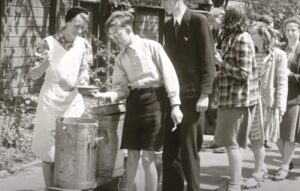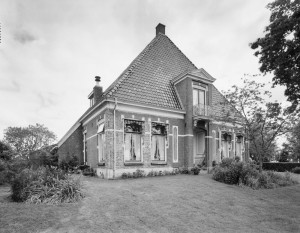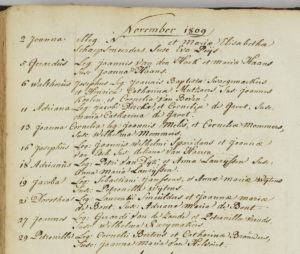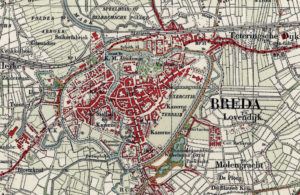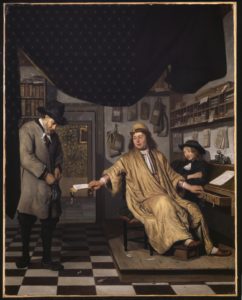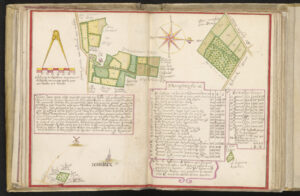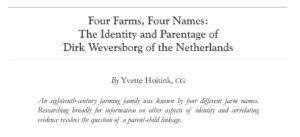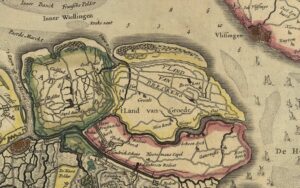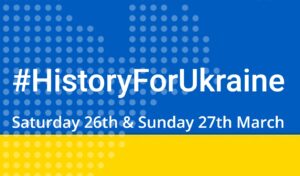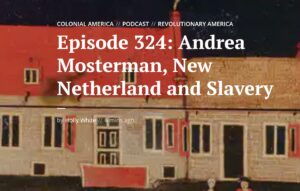A gaarkeuken is a soup kitchen, a place where poor people could go to be fed. Gaarkeukens are best known from World War II, when the watery soup they supplied was the only food for many people in the west of the country. The Hunger Winter of 1944/1945 had left people desparately hungry. Soup kitchens remained in use for a while after the liberation, until people were able to take care of themselves again. Nowadays, the word gaarkeuken is no longer in use, but there are voedelbanken (food … [Read more...]
Ownership vs. Occupation
I listened to a presentation by Sue Adams about our farming ancestors, and she talked to the difference between ownership and occupation. You can own a house where you do not live, and you can live in a house you do not own. Similarly, you can own land you do not farm, or farm land you do not own. Ownership creates different records than occupancy. Typically, ownership creates more records, and tenants or people who lease land can be harder to trace. My recent article "Four Farms Four Names" … [Read more...]
Dutch term – DTB, DTBL
DTB is an abbreviation for Doop-, Trouw- en Begraafboeken [Baptismal, marriage, and burial books]. Sometimes, you see it as DTBL where the L stands for lidmaten [members]. You may come across the term in publications, finding aids, research guides, or source citations. Check this article for more Dutch genealogical abbreviations. … [Read more...]
Quick tip – Check for records in the nearest bigger town
Many people who lived in villages created records in the bigger towns in the area. They may have worked in the bigger town, and created employment records. They may have gone to a notary in the bigger town to have a will or prenuptial agreement drawn up. They may have had business with someone in the bigger town, which could have created transport records or contracts, found in the court or notarial records. The court in the bigger town may have had the higher jurisdiction, and may be where … [Read more...]
Dutch term – Royement
A royement can have multiple meanings, all having to do with cancellation or ceasing to be valid. When referring to persons, it is a disbarment or revoking of membership. When referring to records, it means the record itself is cancelled, for example when a mortgage is paid. You may come across the term in contemporary summaries of notarial records. Royementen of mortgages were typically created and handed to the interested party, rather than also being copied into the notaries' minutes. The … [Read more...]
Dutch Genealogy News for March 2022
This is an overview of the new sources, websites, and projects that were announced last month. Sources Records of 66,000 members of the Dutch merchant navy have been added to Oorlogsbronnen, a portal for sources related to World War II. Several new transcriptions of Limburg church records have been added to GenBronnen. A transcription of the Dutch Reformed baptisms of Alblasserdam (1610-1811) is now available via Geneaknowhow. The National Archives launched new online … [Read more...]
Farm Names Case Study in NGSQ
My article "Four Farms, Four Names, The Identity and Parentage of Dirk Weversborg of the Netherlands" has just been published in the National Genealogical Society Quarterly. I am so proud to have my article published in this leading journal in our field. This case study is special to me. It is the first complex evidence case study I ever solved, when I was 16, proving the parents of my generation 9 ancestor Dirk Weversborg. He appears in records under three different farm names, and his … [Read more...]
Extreme Ancestors – Jan de Witte, age 105 (or not?)
I thought it would be fun to do a series of blog post about the extremes in my tree. The oldest person, the youngest parent, the most spouses, the most children, the one who moved the farthest away; you get the idea. In this first article, I present you Jan de Witte, who died in Cadzand in 1754 at the reported age of 105 years and eight months. 1748 census The earliest record I found that indicated Jan's age was the 1748 census of Cadzand, which included the following household: Jan de … [Read more...]
History For Ukraine Event
This weekend, there will be a 24-hour live event History for Ukraine. Speakers from all over the world will give short presentations about history and genealogy. The proceeds will to the British Red Cross Society’s DEC Ukrainian Humanitarian Appeal. Admission is free, so you can pay what you think it is worth and give a Donation via JustGiving. Check out the History for Ukraine for details about the line-up and schedule, and for the link to the YouTube channel for the live event. … [Read more...]
Quick Tip – Podcast episode about New Netherland and Slavery
Andrea Mosterman features in episode 324 of the podcast Ben Franklin's World. The episode is called "New Netherland and Slavery." She discusses how the colony of New Netherland took shape, and the ways how the West India Company and private persons used enslaved labor to develop the colony. … [Read more...]
